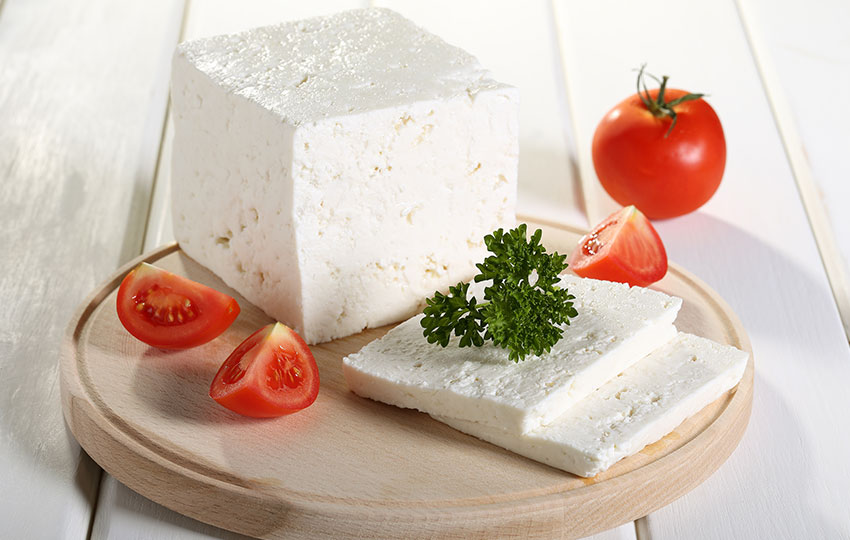Feta cheese is a white, brined cheese having a creamy and soft texture. When compared to other cheese types, it has lower fat and calories. It even has a good amount of calcium, phosphorus, and Vitamin B, which can benefit your bone health. Furthermore, Feta has advantageous fatty acids and bacteria. So let’s take a tour of some amazing Feta Cheese Nutrition Facts.
Contents
Some Unbelievable Feta Cheese Nutrition Facts
Feta Cheese Nutrition Facts – The white-coloured, soft cheese, namely Feta cheese, is made of goat and sheep milk. It is among the oldest cheese varieties available and renowned for its slightly sour flavour yet rich aroma. Feta cheese offers an excellent nutrient source such as protein and calcium and has high saturated fat and sodium content.
Feta Cheese Nutrition Facts
This cheese has lower fat content in comparison to other kinds of cheese. Nevertheless, feta cheese is a sensible choice to have in moderation. It isn’t conventionally made out of cow milk, yet with goat and sheep, it allows easier digestion.

Feta Cheese Nutrition Facts – What’s in 1 ounce?
Feta Cheese appears to be a healthful option. An ounce or 28 grams of feta cheese offers:
- Calories: 74
- Protein: 4 grams
- Fat: 6 grams
- Carbs: 1.1 grams
- Calcium: 14% of the Recommended Dietary Intake (RDI)
- Riboflavin: 14% of the RDI
- Phosphorus: 9% of the RDI
- Sodium: 13% of the RDI
- Selenium: 6% of the RDI
- Vitamin B12: 8% of the RDI
- Vitamin B6: 6% of the RDI
- Zinc: 5% of the RDI
Feta cheese nutrition facts also includes a standard amount of magnesium, pantothenic acid, folate, Vitamin K and A, and iron. An ounce of parmesan or cheddar has over 7gm of fat, and 110 calories, whereas an ounce, i.e., 28 grams of feta cheese, has six grams of fat and 74 calories.
Moreover, Feta Cheese Nutrition Facts had enough Vitamin B and calcium over cheeses such as goat cheese, cottage cheese, mozzarella, or ricotta.
Let’s take a tour through some fantastic Feta Cheese Nutritional Facts.
- Feta is nutritious and medium-calorie cheese that has high protein, minerals, and vitamin content. One hundred grams of Feta contains 21.5 grams of total fats and 265 calories.
- Feta offers standard protein, which a good amount of vital amino acids are required for muscular development and growth and staying healthy and fit. One hundred grams of Feta cheese has around 25% of RDI or 14.2 grams of protein.
- As Feta is a dairy product, it is gluten-free. Celiac disease or gluten-sensitive individuals are an imperative gluten-free item rich in vitamins, protein, and minerals.
- Feta is the best phosphorus, calcium, and dietary magnesium source in a Mediterranean diet. Furthermore, it is rich in Vitamin D, plays a crucial role in growth and bone strengthening, especially in children.
- The volatile flavour chemical mixture which comes up while Feta’s ageing comprises acetone, acetaldehyde, 3-methyl butane-1-ol, heptanal, hydro butanal, ethyl-acetate, 3-methyl butanal, buton-2-ol, hexanal, pentane-1-ol, etc. Present characteristic slightly acidic, salty, and mildly rancid flavour to it.
- Feta is an ideal fat-dissolving vitamins source, mainly Vitamin A. 14% of the RDI or 422 IU vitamins in 100 grams of aged Feta.
- Feta has a tiny lactose amount of around 0.13 grams per 125 grams of serving. This makes it among the moderate-lactose calcium and protein’s dietary source in lactose-intolerant individuals. Most milk’s lactose is transformed into efficiently ingestible lactic acid with mesophilic bacteria while producing cheese.
- Feta is the highly concentrated mineral source, mainly magnesium, zinc, calcium, and phosphorus.
- In the ripening process, the vital milk constituents like milk proteins, milk lipids, and lactose go through a biochemical transformation to health-benefiting and easily digestible products.

Some Lesser Known Feta Cheese Nutrition Facts
- Feta is a cheese variant made from goat or sheep milk, or usually both; even though, at times, cow milk is utilized as a substitute.
- Feta is pickled white cheese made with curd, which is drained, cut, and finally soured, thereby dipped in brine and left foraging for a longer time.
- If maintained in the fitting room and refrigerated temperature combination, it may take three or even more months for the feta cheese to age. It requires to be kept in a gentle brine solution such that it doesn’t dry out.
- The word ‘Feta’ is a Greek term having a similar spelling or ‘pheta’ as the alternative one, interpreted as ‘slice.’
- Feta is obtainable in the firm and soft varieties. The former ones are a bit expensive and come with a crumblier texture and more holes, while the softer ones are usually cheaper yet come in less quantity.
- Feta’s flavour is a mixture of salty, sour, and tangy and, at times, is flavoured with spices, herbs, oils, or other constituents.
- Feta was consumed and formed in Ancient Greece. Ancient Greece started this cheese in the famous poem in the Era 700s BC, Odyssey.
- This cheese is generally included in various dishes for additional flavours and is consumed with salads, cooked in omelettes, grills, and pies, served with oil and olives, and is even utilized in Sandwiches.
Final Words
Nevertheless, this cheese kind has a higher amount of sodium. Therefore, it is also advisable for pregnant ladies to stay away from unpasteurized Feta. However, for maximum individuals, Feta is ideally safer to consume. You may even use it in several recipes varying from desserts to appetizers. Lastly, Feta is a very healthy and delicious addition to the diet of maximum people.
